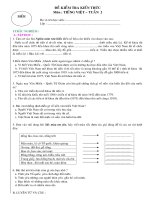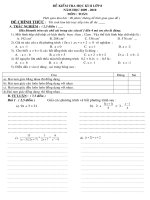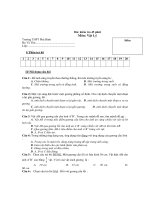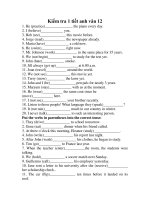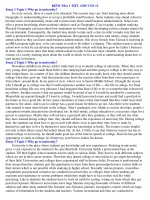KIỂM TRA KIẾN THỨC ANH VĂN 12 – ĐỀ 2 ppt
Bạn đang xem bản rút gọn của tài liệu. Xem và tải ngay bản đầy đủ của tài liệu tại đây (64.06 KB, 4 trang )
KIỂM TRA KIẾN THỨC ANH VĂN 12 – ĐỀ 2
Choose the word which has the underlined part pronounced differently from the
rest.
1. a. apply b. university c. identity d. early
2. a. choice b. achieve c. each d.
chemistry
3. a. final b. applicant c. high d.
decide
4. a. average b. indicate c. application d. grade
5. a. course b. four c. our d.
yours
Choose a, b, c, or d that best completes each unfinished sentence, substitutes the
underlined part, or has a close meaning to the original one.
6. There are two types of higher education in _______ UK: higher general education
and higher vocational education.
a. a b. an c. the d. Ø
7. The examination results of the A-Levels determine if _______ student is good enough
to go to _______ university or college.
a. Ø / the b. a / a c. the / an d. Ø /
an
8. Many parents do not let their children make a decision _______ their future career.
a. in b. about c. on
d. out
9. You are old enough. I think it is high time you applied _______ a job
a. in b. of c. for d. upon
10. He has not been offered the job because he cannot meet the _______ of the company.
a. requirements b. applicants c. information d. education
11. _______ education is normally taken to include undergraduate arid postgraduate
education, as well as vocational education and training.
a. Primary b. Tertiary c. Secondary d. Intermediate
12. The University of Cambridge is a prestigious _______ of higher learning in the UK
a. tower b. hall c. house d.
institute
13. - Which subject do you _______ at university? - I major in Math.
a. do b. make c. practice d.
demonstrate
14. A _______ is an official document that you receive when you have completed a
course of study or training.
a. vocation b. subject c. certificate d. grade
15. In many countries, prospective university students apply for _______ during their last
year of high school.
a. achievement b. information c. course d. admission
16. Parents can express a _______ for the school their child attends.
a. prefer b. preference c. preferential d. preferable
17. Many people have objected to the use of animals in _____ experiments.
a. science b. scientist c. scientific d. scientifically
18. I would like to invite you to participate in the ceremony.
a. graduate b. graduated c. graduation d. graduating
19. You can either come by bus _______ take a taxi.
a. and b. or c. not d. nor
20. Either you or I _______ going to meet Professor Pike at the airport.
a. am b. were c. are d. has
been
21. If you _______ to my advice, you _______ in trouble now.
a. listened / were not b. listen / are not.
c. had listened / would not have been d. had listened / would not be
22. If you take the 8 a.m. flight to New York you _______ change planes.
a. could not have to b. will not have to
c. had not had to d. would not to have to
23. If it _______ warm yesterday, we would have gone to the beach.
a. was b. were c. had been d.
could be
24. If it _______ an hour ago, the streets _______ wet now.
a. were raining / will be b. had rained / would be
c. rained / would be d. had rained / would have been
25. _______ here, he would helped us with these troubles.
a. Were Peter b. If were Peter
c. Unless were Peter d. Unless Peter were
26. _______ that problem with the car, we wouldn't have missed the speech.
a. If we had had b. If had we had
c. Unless we had had d. Provided that we had had
27. If I were a little taller, I _____ be able to water the plant on tl.1etop shelf.
a. did b. would c. had d. would have
28. If you hear from Susan today, _______ her to ring me.
a. tell b. to tell c. telling
d. will tell
29. She had to have the operation _______.
a. unless she would dies b. if she would die
c. otherwise she will die d. or she would die
30. If the traffic _______ bad, I may get home late.
a. is b. were c. was
d. had been
Choose the sentence which has the closest meaning to the original one.
31. If I were taller, I could reach the top shelf:
a. I am not tall enough to reach the top shelf.
b. I am too tall to reach the top shelf.
c. I cannot reach the top shelf because I am very tall.
d. In spite of being tall, I cannot reach the top shelf.
32. If only I had studied hard enough to pass the final exam.
a. I regret not studying hard enough to pass the final exam.
b. I had studied hard enough and I passed the final exam.
c. I studied too hard to pass the final exam.
d. I studied hard otherwise I would fail the final exam.
33. John speaks Chinese fluently because he used to live in China for ten years.
a. Suppose John has lived in China for ten years, he can speak Chinese fluently.
b. Provided that John lived in China for ten years, he could speak Chinese fluently.
c. Unless John had lived in China for ten years, he could not have spoken Chinese
fluently.
d. John could not speak Chinese fluently if he had not lived in China for ten
years.
34. Peter said if he were me he would stop smoking.
a. I wanted Peter to stop smoking and he promised to do.
b. Peter promised to stop smoking.
c. Peter said he would stop smoking as I wanted him to.
d. Peter advised me to stop smoking.
35. I will agree to these conditions provided that they increase my salary.
a. They did not increase my salary so I quit the job.
b. I will only agree these conditions if they give me more money.
c. They give me more money or I will only agree these conditions.
d. Unless they give me more money, I will only agree these conditions.
Read the passage carefully and choose the correct answer.
As Chinese society changes, higher education is undergoing major transformations.
The university model of the United States and other Western countries has a powerful
influence. New trends in Chinese higher education are attracting the attention of global
educators. Since the establishment of Western-oriented modern universities at the end of
nineteenth century, Chinese higher education has continued to evolve. Over the past two
decades, however, tremendous economic development in China has stimulated reforms in
higher education that have resulted in some remarkable changes.
The first modern institution, Peiyang University, was founded in Tianjin. The
university changed its name to Tianjin University in 1951 and became one of the leading
universities in China: Next, Jiaotong University was founded in Shanghai in 1896. In the
1950s, most of this university was moved to Xi'an, an ancient capital city in northwest
China, and became Xi'an Jiaotong University; the part of the university remaining in
Shanghai was renamed Shanghai Jiaotong University.
Tianjin University celebrated its hundredth anniversary in 1995, followed by Xi'an
Jiaotong and Shanghai Jiaotong Universities in 1996. Other leading universities, such as
Zhejiang University (1897), Beijing University (1898), and Nanjing University (1902)
also recently celebrated their hundredth anniversaries, one after another. These
celebrations marked the beginning of a new chapter in Chinese higher education.
36. The text is about _______.
a. Chinese education system
b. some famous universities in China
c. the western influences on Chinese education
d. application for a university in China
37. Chinese higher education _______.
a. is not affected by any others
b. has not really well-developed
c. has developed since the end of nineteenth century
d. is not paid any attention by global educators
38. Chinese higher education _______.
a. has been stable since nineteenth century
b. has decreased over the past two decades
c. has not got any changes
d. has been affected by the country's economic development
39. Tianjin University was founded in _______.
a. 1895 b. 1896 c. 1950
d. 1951
40. Which university celebrated the hundredth anniversaries in 2002?
a. Nanjing University b. Shanghai Jiaotong University
c. Xi'an Jiaotong University d. Beijing University
Full in each numbered blank with one suitable word or phrase.
Since China adopted its open-door (41) _____ approximately twenty-five years ago,
Chinese higher education has begun once again to draw closer to the (42) _____ Western
world. China's (43) _____ to send scholars and students to the United States at the end of
the 1970s, after thirty years of hostility between the two countries, marked a dramatic
turning (44) _____ in the nation's educational history. Today, about 50,000 Chinese
students, are studying in the United States, accounting (45) _____ 10 percent of the total
international students in the country. More and (46) _____ Chinese students have gone to
other countries to study. According to statistics from the United Nations Educational,
Scientific, and Cultural Organization (UNESCO), China (47) _____ more students than
any other country to study abroad. In the other direction, many students from the United
States and (48) _____ are going to China to study language, culture, history, traditional
Chinese medicine, science, engineering, and other (49) ______. The increasing number
of international students worldwide demonstrates a relatively quick change in the (50)
_____ of global education.
41. a. way b. law c. rule d. policy
42. a. progress b. advanced c. head d.
reach
43. a. decide b. decisive c. decision d. decider
44. a. point b. spot c. top d. stain
45. a. for b. to c. up d. over
46. a. as b. more c. than
d. much
47. a. regards b. mails c. posts
d. sends
48. a. elsewhere b. wherever c. where d.
whereas
49. a. matters b. things c. fields d.
items
50. a. interfere b. integration c. exchange d. mixture
